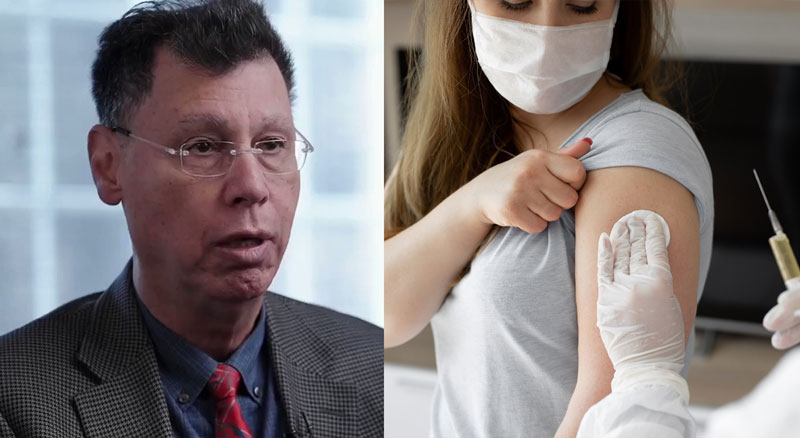Top Doctor Warns ‘Turbo Cancers’ Are Spreading ‘Dramatically’: ‘This Is Not Normal’
A world-renowned epidemiologist is raising the alarm over soaring rates of “turbo cancers,” which he warns are spreading “dramatically.”
Dr. Harvey Risch is a Professor Emeritus of Epidemiology at Yale University.
Risch specializes in the areas of cancer etiology, prevention, and early diagnosis, and in epidemiologic methods.
The professor was awarded a $3.65 million National Institutes of Health (NIH) grant for a five-year study of the etiology of pancreas cancer cases in Connecticut.
After discovering a disturbing rise in “turbo cancers,” Risch is now speaking out to warn the public about his findings.
The term “turbo cancer” is being used by experts to describe the recent emergence of aggressive cancers that grow very quickly.
According to Risch and other leading cancer specialists, cases of this new phenomenon have risen rapidly in the past two years.
“These cancers that normally would be kept in check by the body are unexpectedly growing very quickly,” Risch explained in a recent interview with The Epoch Times.
“We know that the Covid vaccines have done various degrees of damage to the immune system in a fraction of people who’ve taken them.
“And that damage could be anywhere from getting Covid more often, getting other infectious diseases, and perhaps it may also be cancer in the longer term,” he warned.
Risch is not alone in his concern, however.
Many leading doctors, including renowned pathologist Ryan Cole, have been sounding the alarm about “turbo cancers.”
“Because of the dysregulation of the immune responses and the suppression of the immune system by these genetic-based injections … these cancers that normally would be kept in check by the body are unexpectedly growing very quickly,” Dr. Cole previously warned during an interview with Children’s Health Defense.
But the worst may be yet to come, Risch forewarns.
“The idea that a new product like the [COVID] vaccines could cause cancer is not something that’s going to be observable overnight,” he explains.
“Cancer as a disease takes a long time to manifest itself from when it starts, from the first cells that go haywire until they grow to be large enough to be diagnosed or to be symptomatic, can take anywhere from two or three years for the blood cancers, like leukemias and lymphomas, to five years for lung cancer, to 20 years for bladder cancer, or 30, 35 years for colon cancer, and so on.”
“So these are long-term events, and if you suddenly introduce a new product like the vaccines, the first thing you might expect to see would be the blood cancers that I mentioned but not the other kinds of cancers.”
Nevertheless, rises in blood-related disorders are already showing up in official government data.
Data analyst Edward Dowd shed light on yearly UK PIP clearances (payments) by body system earlier this year.
Dowd’s analysis examines different metrics for 2020, 2021, and 2022.
The highly respected data expert found was hematological (blood-related) claims were up a staggering 522% above the trend in 2022.
It’s not just blood-related disorders that are soaring, however.
Cancers that normally take ten, twenty, or thirty years to develop, are rapidly emerging in patients.
Risch asserts that COVID-19 shots are causing the body’s immune system to “go haywire.”
He says that cancers are being theoretically sped up by immune-suppressing MRNA shots.
Cancers that previously took years to develop could now surface at increased rates in the long term, Risch indicated.
But we’re already seeing signs of this happening as young people.
There have been increasing reports of people in the prime of their lives suddenly suffering from cancer at unprecedented rates.
26-year-old YouTuber Colby Brock shared his testicular cancer diagnosis with his subscribers on July 9, 2023.
Dr. William Makis has done an entire deep dive into young social media influencers getting cancer on his Substack page.
According to Dr. Risch, if a 25-year-old develops colon cancer without a family history of the disease, then something else must be at play.
“That’s impossible along the known paradigm for how colon cancer works,” he notes.
He added that other long-latency cancers are surfacing in very young people.
“This is just not the normal occurrence of how cancer works,” the professor asserted.
“Because these cancers have been occurring in people who are too young to get them, basically, compared to the normal way it works, they’ve been designated as turbo cancers,” Risch added.
“Some of these cancers are so aggressive that between the time that they’re first seen and when they come back for treatment after a few weeks, they’ve grown dramatically compared to what oncologists would have expected.”
As questions mount over what is causing the soaring numbers of turbo cancer patients, Risch explained.
“There has to be some initiating stimulus,” he said.
As Risch has previously stated, “The COVID-19 vaccines have done various degrees of damage to the immune system in a fraction of people who’ve taken them.”
“In my opinion, cancer is something that the body normally fights off because the cells that get created when they go haywire — the immune system mostly recognizes and manages to gobble them up or disable them so that they don’t progress.
“But if you damage the immune system in a way that limits the ability to recognize or to disable newly-growing, deranged cancer cells, then that opens the door to them multiplying to the point where it’s beyond the immune system to cope.
“And that’s the mechanism, I think, that’s the most likely here.”
READ MORE: 24 Years Wiped from Life Expectancy of ‘Fully Boosted’ Men, Study Shows





